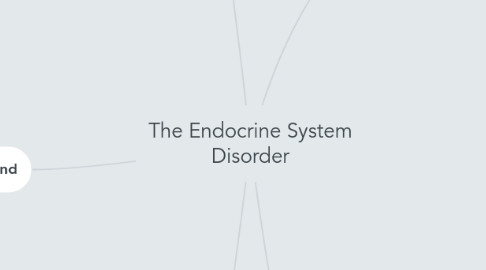
1. Parathyroid Gland
1.1. Hypothyroidism
1.1.1. Etiology
1.1.1.1. Pituitary or hypothalamic failure causing secondary hypothyroidism
1.1.2. Clinical Findings
1.1.2.1. Weight gain
1.1.2.2. Constipation
1.1.2.3. Dry eyes
1.1.3. Laboratory Diagnosis
1.1.3.1. Thyroid Function Test (serum)
1.2. Hyperthyroidism
1.2.1. Etiology
1.2.1.1. Due to excess iodine, inflammation of the thyroid & large amounts of tetraiodothyronine taken through dietary supplements or medication.
1.2.2. Clinical Findings
1.2.2.1. Dizziness
1.2.2.2. Restlessness
1.2.2.3. Fast & irregular heart rate
1.2.2.4. Difficulty in sleeping
1.2.3. Laboratory Diagnosis
1.2.3.1. Thyroid Function Test (serum)
2. Pituitary Gland
2.1. Anterior
2.1.1. Prolactinoma
2.1.1.1. Etiology
2.1.1.1.1. condition in which a noncancerous tumor (adenoma) of the pituitary gland in brain overproduces the hormone prolactin
2.1.1.2. Clinical Findings
2.1.1.2.1. Irregular menstrual period
2.1.1.2.2. Erectile dysfunction
2.1.1.2.3. Infertility
2.1.1.3. Laboratory diagnosis
2.1.1.3.1. Prolactin test
2.1.1.3.2. Thyroid Function Test
2.1.2. Growth Hormone Adenoma
2.1.2.1. Etiology
2.1.2.1.1. An excessive production of growth hormone causes acromegaly in adults or gigantism in children.
2.1.2.2. Clinical Findings
2.1.2.2.1. Gigantism
2.1.2.2.2. Acromegaly
2.1.2.3. Laboratory Diagnosis
2.1.2.3.1. Growth hormone test
2.2. Posterior
2.2.1. Syndrome of Inappropriate Anti-diuretic Hormone (SIADH)
2.2.1.1. Etiology
2.2.1.1.1. Excessive levels of antidiuretic hormones in body
2.2.1.2. Clinical Findings
2.2.1.2.1. Seizure
2.2.1.2.2. Confusion
2.2.1.2.3. Loss of appetite
2.2.1.3. Laboratory Diagnosis
2.2.1.3.1. Urine for Sodium test
2.2.1.3.2. ADH Test
2.2.2. Diabetes Insipidus
2.2.2.1. Etiology
2.2.2.1.1. Caused by low or absent secretion of the water-balance hormone vasopressin from the pituitary gland of the brain, or by a poor kidney response to this chemical messenger, which is also called antidiuretic hormone.
2.2.2.2. Clinical Findings
2.2.2.2.1. Polyuria
2.2.2.3. Laboratory Diagnosis
2.2.2.3.1. 24hrs urine collection
3. Pancreas
3.1. Diabetes Mellitus
3.1.1. Etiology
3.1.1.1. TYPE 1 DM known as juvenile diabetes or insulin-dependent diabetes, is a chronic condition in which the pancreas produces little or no insulin.
3.1.2. Clinical Findings
3.1.2.1. Blurred vision
3.1.2.2. Polyuria
3.1.2.3. Fatigue
3.1.2.4. Numbness
3.1.3. Laboratory Diagnosis
3.1.3.1. Fasting blood sugar
3.1.3.2. Random blood sugar
3.1.3.3. Oral glucose tolerance
3.1.3.4. Urine for glucose test
3.1.3.5. HbA1c
4. Thyroid Gland
4.1. Grave's Disease
4.1.1. Etiology
4.1.1.1. An autoimmune disease characterized by hyperthyroidism due to circulating auto antibodies. Thyroid-stimulating immunoglobulins (TSIs) bind to and activate thyrotropin receptors, causing the thyroid gland to grow and the thyroid follicles to increase synthesis of thyroid hormone.
4.1.2. Clinical Findings
4.1.2.1. Goiter
4.1.2.2. Grave's opthalmopathy
4.1.2.2.1. Eyes protrude from the eye sockets.
4.1.2.3. Pretibial Myxedema
4.1.2.3.1. Patchy and pink skin lesions.
4.1.2.4. Intolerance to heat
4.1.2.5. Slow speech
4.1.2.6. Weight loss
4.1.3. Laboratory Diagnosis
4.1.3.1. Thyroid Function Test (serum)
4.1.3.1.1. T4
4.1.3.1.2. T3
4.1.3.1.3. TSH
4.1.3.2. Thyroid Stimulating Immunoglobulin (TSI)
4.2. Hashimoto Thyroiditis
4.2.1. Etiology
4.2.1.1. Caused by an autoimmune process that causes inflammation of the thyroid gland.
4.2.2. Clinical Findings
4.2.2.1. Increase in metabolic process
4.2.2.2. Increase in stomach acid
4.2.2.3. Fatigue
4.2.2.4. Weight gain
4.2.3. Laboratory Diagnosis
4.2.3.1. Thyroid Function Test ( serum)
4.2.3.1.1. T4
4.2.3.1.2. T3
4.2.3.1.3. TSH
4.2.3.2. Thyroid Simulating Immunoglobulin (TSI)
5. Adrenal Gland
5.1. Cushing's Disease
5.1.1. Etiology
5.1.1.1. Due to excess secretion of cortisol
5.1.2. Clinical Findings
5.1.2.1. Hypertension
5.1.2.2. Obesity
5.1.2.3. Depression
5.1.2.4. Osteoporosis
5.1.3. Laboratory Diagnosis
5.1.3.1. Serum cortisol test
5.1.3.2. Random/24hrs urine cortisol test
5.2. Addison's Disease
5.2.1. Etiology
5.2.1.1. due to low secretion of cortisol
5.2.2. Clinical Findings
5.2.2.1. Fatigue
5.2.2.2. Hypotension
5.2.2.3. Hypoglycemia
5.2.2.4. Hypocalcemia
5.2.3. Laboratory Diagnosis
5.2.3.1. Serum cortisol test
5.2.3.2. Random/ 24hrs urine cortisol test

